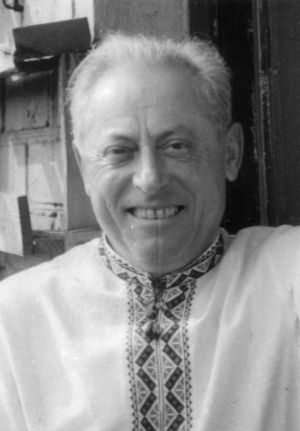KUZMENKO, OLEKSANDR OLEKSIIOVYCH (born February 26, 1926, in the village of Lotsmanska Kamianka near Dnipropetrovsk – died July 14, 1999, in Dnipropetrovsk)
Member of the OUN, political prisoner, driver. Participant in the Ukrainian resistance movement.
His father had served in Nestor Makhno’s army. During the German occupation, in the summer of 1942, the 16-year-old Oleksandr became a member of the Organization of Ukrainian Nationalists (OUN), which was active in his native village. He was the leader of a youth unit and a liaison for the district leadership. He distributed nationalist literature. After the return of the Red Army in March 1944, he was sentenced to 8 years for these activities. He served his sentence in Inta (Komi ASSR). Upon his release into exile, he met Olena Fedorivna Zolotiuk from Galicia, who had also been sentenced to 10 years as a liaison for the Ukrainian Insurgent Army (UPA). They married and moved to Dnipropetrovsk.
Kuzmenko began working as a driver. They built a house at 20-A Armiiska Street, which in the 1960s–80s became the heart of Ukrainian national life in Dnipropetrovsk. The homeowners observed folk customs and religious holidays. They amassed a large library, the jewel of which was a collection of editions of the *Kobzar*, most of which Kuzmenko knew by heart and recited masterfully. Kuzmenko also collected a “Leniniana”—a collection of Lenin’s statements about Ukraine. Their daughter, Oksana, learned to play the bandura, and the entire Kuzmenko family were fine singers. Their love for Ukraine was natural. Young Ukrainian intellectuals were drawn to them. Birthdays, religious holidays, and literary and artistic evenings were celebrated there. This house was visited by Oleksandr’s own brother, the engineer Petro Kuzmenko; the poet Ivan SOKULSKY; the translator Oles ZAVHORODNIY with his wife, Tamara; the teacher Havrylo PROKOPENKO; the writers Volodymyr SIRENKO, Viktor SAVCHENKO, Liubov Holota, Mykhailo Chkhan, and Hryhoriy Malovyk; the sound engineer Halyna Savchenko with her mother, Nina (Neonila) Pavlivna Strilchuk; the academics Panas Didenko, Oleksiy Klymenko, and Borys DOVHALIUK; the philologist Mykola BERESLAVSKY and his family; the married poets Raisa LYSHA and Yuriy VIVTASH; the family of Mykola KULCHYNSKY; the kobzar Oleksa Chupryna; students; and fellow villagers. This circle celebrated Shevchenko Days and, under the surveillance of police and KGB agents, went to Monastyrskyi (then Komsomolskyi) Island to lay flowers at his monument. Kuzmenko himself traveled to Kyiv and Lviv (a photograph exists from Christmas at the Sadovsky home in 1972, where Kuzmenko is in the company of L. POPADIUK, V. STUS, I. KALYNETS, M. HORYN, S. SHABATURA, M. HATALA, and others).
For such “nationalist activity,” the Kuzmenkos were repeatedly summoned to the KGB, and in 1964 and 1969, they were issued “warnings,” although the authorities could not incriminate them with anything specific.
After the arrest of Ivan SOKULSKY on June 14, 1969, Kuzmenko was repeatedly summoned for questioning. It turned out that he had transported the “Letter from the Creative Youth of Dnipropetrovsk” (in defense of Oles Honchar’s novel *The Cathedral*) to Kyiv and Lviv, after which it made its way abroad and was broadcast on Radio Liberty. The authorities tried to charge Kuzmenko as a co-author of the “Letter…” because it included facts he had recounted to SOKULSKY. On June 5, 1970, at Motor Transport Enterprise No. 2190, where Kuzmenko worked, a “meeting of the labor collective” was held with the agenda: “On the ideologically harmful behavior of the driver Oleksandr Kuzmenko.” A lengthy article about this “workers’ trial” was published in the regional newspaper *Zorya*. However, even after this, the Kuzmenkos did not shun the friends who dared to visit them.
On December 20, 1983, Kuzmenko was detained by the police, allegedly for being drunk. To avoid trouble, he gave a false name but was identified. This happened shortly after the regional newspaper *Zorya* published a fabricated interview with Ivan SOKULSKY on June 12, 1983, concocted by KGB journalist L. Hamolskyi. In February 1984, Kuzmenko was “tried” at an expanded meeting of the trade union committee. He was also accused of being a “moonshiner” and a “violator of labor discipline” for leaving his vehicle near his home overnight instead of in the garage. The same Hamolskyi wrote a half-page smear article about Kuzmenko in the newspaper.
With the onset of perestroika, the Kuzmenkos took an active part in the activities of Ukrainian civic organizations.
Bibliography:
Sirenko, V.I. *Velyka zona zlochynnoho rezhymu. Pro peresliduvannia ta represii ukrainskykh inakodumtsiv u 70–80-kh rokakh mynuloho stolittia* [The Great Zone of a Criminal Regime. On the Persecution and Repression of Ukrainian Dissidents in the 70s–80s of the Last Century]. – Dnipropetrovsk: Porohy, 2005. – pp. 119-126.
Kuzmenko, Oleksandr Oleksiiovych // *Mizhnarodnyi biohrafichnyi slovnyk dysydivtiv krain Tsentralnoi ta Skhidnoi Yevropy i kolyyshnoho SRSR*. Vol. 1. Ukraina. Part 3. [International Biographical Dictionary of Dissidents from Central and Eastern Europe and the Former USSR. Vol. 1. Ukraine. Part 3]. – Kharkiv: Kharkiv Human Rights Protection Group; “Prava liudyny.” – Part 3. – 2011. – pp. 1174–1175.
